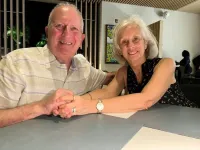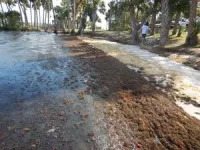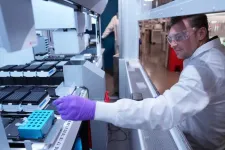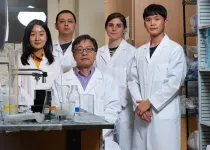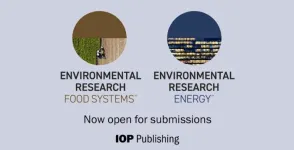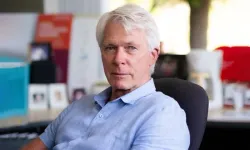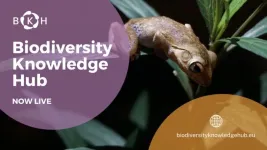(Press-News.org)
HOUSTON ― The University of Texas MD Anderson Cancer Center today announced a
$16.25 million gift from Howard and Susan Elias to accelerate brain tumor and cancer neuroscience research, an emerging field focused on integrating the role of the nervous system in cancer. Howard Elias’ son, Harrison, was diagnosed with brain cancer and underwent successful surgery in 2000. Six years earlier, Howard’s father had died of glioblastoma. These separate diagnoses sparked a giving program over the years, leading to this latest gift which represents the Elias’ continued commitment to MD Anderson’s mission to end cancer and a belief in MD Anderson’s faculty as well as the emerging field of cancer neuroscience.
“Dr. Lang and the incredible team at MD Anderson saved my son’s life more than two decades ago,” said Howard, who has long supported the institution and recently retired as chief customer officer and president of services and digital at Dell Technologies. “Now is the time for us to increase our commitment so we can play a significant role in advancing cancer neuroscience research specifically focused on brain tumors and the nervous system. We want other families to have the chance to see their son grow up, like our family has.”
The Elias’ gift serves as the lead donation to concentrate cross-disciplinary research in cancer neuroscience at MD Anderson. The gift aims to extend patients’ lives and to eliminate their suffering through a comprehensive understanding of the interactions of the nervous system with cancer. Additionally, the Elias family’s generosity and foresight will provide secure, sustainable support for generations of researchers to come as they push the limits in searching for new therapies and cures.
“A future free from cancer is unattainable unless we work together,” said Peter WT Pisters, M.D., president of MD Anderson. “Howard and Susan’s generosity and passion will play a crucial role as we work in this emerging space for generations to come. On behalf of our patients and their families, we extend our heartfelt gratitude.”
Life-saving surgery sparks decades-long philanthropy
Harrison Elias was just shy of 7 years old when he was diagnosed with hypothalamic pilocytic astrocytoma, a form of brain cancer.
“Harrison, his mother and sisters were visiting at his grandparents in Michigan,” said Howard. “They were playing cards and Harrison’s hand flipped around to where his cards were showing. When he said he couldn’t control his hand, we knew immediately something was wrong.”
The initial prognosis the Elias family received was not very promising. They began intensive research and sought multiple opinions around the country. Since they were living in The Woodlands, a suburb of Houston at the time, one of those opinions they sought was from the number one center for cancer care located just across town — MD Anderson.
“We met with Dr. Joann Ater and will never forget her kindness and professionalism,” Howard said. “From there we were connected to Dr. Frederick Lang, who performed the surgery to resect Harrison’s brain tumor a few weeks later. We have stayed in touch with Dr. Lang ever since.”
After the successful surgery, which removed the tumor from the hypothalamus, a deep part of the brain often thought to be inoperable, Harrison spent years building back his physical strength and regaining motor skills that were impacted by the cancer and the treatment. Fortunately, because the tumor was completely removed, Harrison did not need any radiation or chemotherapy. The tumor has not come back after 20+ years.
“Some days I can deadlift 400 pounds but can barely pick up a pencil with my left hand,” says Harrison, who has limited motor function on the left side of his body, a lasting reminder of the brain surgery he underwent as a child. “I have had bad days, actually a lot of bad days, but focusing on the type of person I wanted to be in the future has always gotten me through.”
The future: cancer neuroscience
The nervous system intersects with, and is impacted by, cancer in many ways. This leads to profound and complex consequences for patients, whether pediatric or adult.
“Our focus is on unraveling the fundamental scientific principles driving the cancer-neuroscience interaction,” Lang said. “These advances will drive prevention, early detection and possibly even cures for neurological cancers; will lead to strategies to overcome the adverse effects of cancer treatments on the nervous system; and will address mental health needs in cancer patients, with the ultimate result of dramatically improving outcomes.”
The Cancer Neuroscience Program is a cross-disciplinary program led by Lang, Vinay Puduvalli, M.D., chair of Neuro-oncology, and Jim Ray, Ph.D., director of the Neurodegeneration Consortium (NDC). Jian Hu, Ph.D., associate professor of Cancer Biology, is the scientific director, and Brittany Parker Kerrigan, Ph.D., is associate director of Research Planning and Development. Future endeavors will encompass brain tumor research, neuroscience and neuro-mental health, as well as the toxic side effects of cancer treatment.
“Our relationship with the Elias’ has grown over the years,” Lang said. “They are committed to the progression of treatments in the neuroscience space. It is incredible to see Harrison thriving more than 20 years later. There can and will be more ‘Harrisons’ thanks to their generosity and foresight.”
END
SEATTLE — July 18, 2023 — In a significant milestone for the Allen Institute for Immunology, a division of the Allen Institute, researchers and staff will collaborate with private industry researchers to aid in the detailed molecular understanding of disease, in service of developing new treatments and therapies to improve human health.
Specifically, Allen Institute scientists will work with researchers from Eli Lilly and Company (Lilly) to investigate and profile disease state diversity and biomarkers for drug response involving atopic dermatitis (eczema) and rheumatoid arthritis using Allen Institute-developed ...
CEPI, the Coalition for Epidemic Preparedness Innovations, and the Houston Methodist Research Institute (HMRI), have today announced a partnership to combine cutting-edge artificial intelligence (AI) technology with established laboratory techniques to speed up development of future vaccines against novel viral threats (also known as Disease X). HMRI will lead a consortium including experts from Argonne National Laboratory (University of Chicago), J Craig Venter Research Institute, La Jolla Institute, The University of Texas Medical Branch, and The University of Texas, ...
PULLMAN, Wash. – Without intervention, the colorful but devastating Japanese beetle could make its way across the evergreen state within two decades, according to a study of their potential dispersion.
The iridescent, green-and-copper beetles damage plants by “skeletonizing” their leaves, chewing up all the soft green parts between the veins. They eat over 300 plants and pose a serious threat to Washington agriculture as some of their favorite crops include grapes, hops and cherries.
Once established, Japanese beetles are tough to eradicate, but it may be possible to keep them under control, said David Crowder, a Washington State University entomologist.
“These ...
Will artificial intelligence (AI) end civilisation? Researchers at Lero, the Science Foundation Ireland Research Centre for Software and University College Cork, are seeking help determining what the public believes and knows about AI and software more generally.
Psychologist Dr Sarah Robinson, a senior postdoctoral researcher with Lero, is asking members of the public to take part in a ten-minute anonymised online survey to establish what peoples’ hopes and fears are for AI and software in general.
“As the experts debate, little attention is given to what the public thinks – and the debate is raging. Some ...
HOUSTON – (July 18, 2023) – Rice University bioengineer Gang Bao and his team have won a 4-year, $2.6 million grant from the National Institutes of Health to address critical questions surrounding the safety and efficacy of using gene editing to treat sickle cell disease.
Because it is caused by a mutation in a single gene, sickle cell disease is a prime candidate for gene editing treatments using tools such as CRISPR-Cas9.
“Sickle cell disease affects over five million people worldwide, and ...
Despite having worse stroke symptoms and living within comparable distances to comprehensive stroke centers, women with large vessel occlusion acute ischemic stroke are less likely to be routed to the centers compared to men, according to a new study from UTHealth Houston.
Led by corresponding author Sunil Sheth, MD, associate professor of neurology and director of the vascular neurology program with McGovern Medical School at UTHealth Houston, and senior author Youngran Kim, PhD, assistant professor of management, policy, and community health with UTHealth Houston School of Public Health, the study was published today in the Journal of the American ...
IOP Publishing’s (IOPP) new environmental research journals are now open for submissions. Announced earlier this year, the two new open access (OA) journals: Environmental Research: Energy and Environmental Research: Food Systems are the latest additions to IOPP’s expanding Environmental Research Series which now includes eight open access titles.
IOPP’s Environmental Research series builds on the established reputation of the journal Environmental Research Letters (ERL) and shares the same outstanding levels of author service, inclusive editorial policies, strict quality assurance and has open science principles at its core.
IOP ...
LA JOLLA, CALIF. – July 18, 2023 –Research from Sanford Burnham Prebys and the Osaka International Cancer Institute has shed new light on the anti-cancer properties of mannose, a sugar that is crucial to many physiological processes in humans and is also known to inhibit the growth of cancer cells. The findings, published in the journal eLife, suggest that mannose could be a helpful secondary treatment for cancer.
“This sugar could give cancer an extra punch alongside other treatments,” says study co-author Hudson Freeze, Ph.D., director of the Human Genetics ...
Brushing twice a day keeps the dentist away – but can we improve on the toothpaste we use to maintain clean teeth, preventing medical issues that spiral from poor dental health? Most toothpastes use fluoride, a powerful tool for oral hygiene. However, fluoride can pose health problems in some cases, especially for children who consume too much fluoride by swallowing most of their toothpaste: children normally use only a tiny dose of toothpaste to avoid these problems, but that reduces toothbrushing efficacy. In the search for alternatives, a team of international scientists and Polish clinicians have identified a hydroxyapatite toothpaste that works just as well as fluoride toothpaste ...
The Horizon 2020 BiCIKL Project is proud to announce that the Biodiversity Knowledge Hub (BKH) is now online.
BKH is a one-stop portal that allows users to access FAIR and interlinked biodiversity data and services in a few clicks. BKH was designed to support a new emerging community of users over time and across the entire biodiversity research cycle providing its services to anybody, anywhere and anytime.
“The Knowledge Hub is the main product from our BiCIKL consortium, and we are delighted with the result! BKH can easily be seen as the beginning of the major shift in the way we search interlinked biodiversity information,”
says Prof. Lyubomir ...
